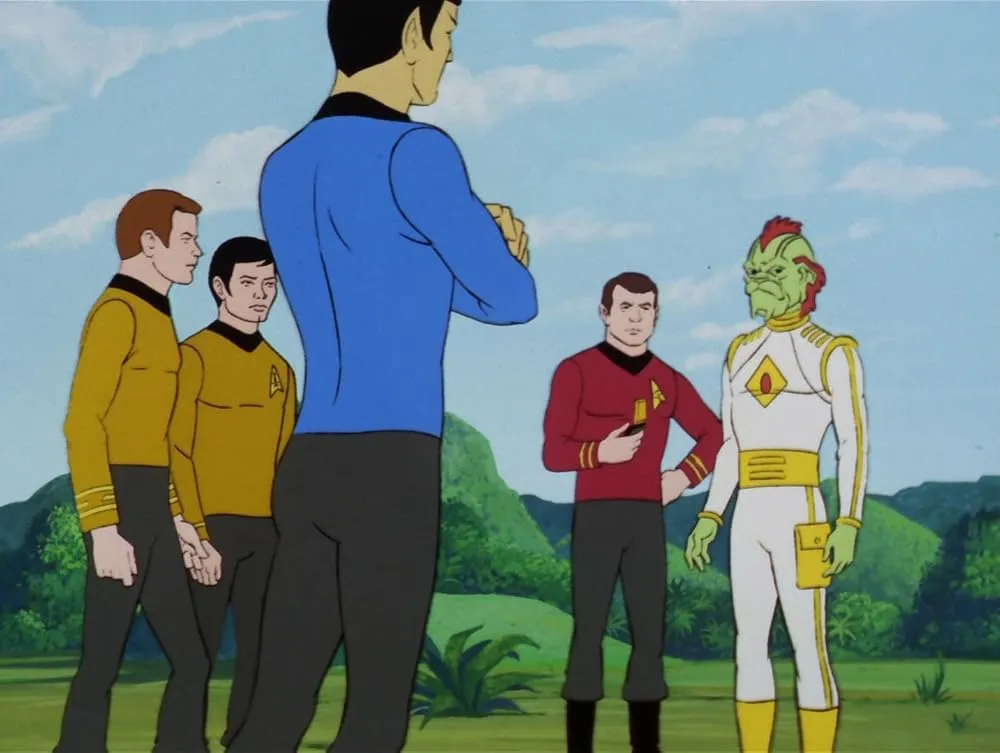
Bem (S02E02)
Airdate: September 14th 1974
Written by: David Gerrold
Directed by: Bill Reed
Running Time: 22 minutes
David Gerrold stands among the most influential authors in Star Trek history, a figure whose contributions have indelibly shaped the franchise’s trajectory. Renowned for his work on The Trouble with Tribbles, the most beloved episode of The Original Series, Gerrold cemented his reputation not only as a master of whimsical storytelling but also as a perceptive critic of Star Trek’s foundational premises. His 1973 book, The World of Star Trek, delivered a sharp, unflinching analysis of the series’ strengths and weaknesses, critiquing its pacing, characterisation, and episodic structure. Surprisingly, Gene Roddenberry, the franchise’s creator and frequent target of Gerrold’s scrutiny, respected this candour. Roddenberry’s trust in Gerrold’s vision led to his involvement with The Animated Series (TAS), where he crafted two episodes: More Tribbles, More Troubles and the less successful Bem. While the former delivered a clever and affectionate sequel to his earlier triumph, Bem—a Season 2 entry—proved a more uneven effort, struggling to balance ambition with coherence.
The episode centres on Commander Ari bn Bem, an alien from the recently contacted planet Pandro, whose biology defies human norms. Bem’s colony-like body allows him to disassemble and reassemble his limbs at will, a trait that manifests as both a scientific curiosity and a source of mischief. Starfleet dispatches Bem to the USS Enterprise to observe interstellar diplomacy, and he accompanies Captain Kirk, Spock, Scotty, and Sulu on a mission to study the indigenous lifeforms of Delta Theta III. The planet’s dinosaur-like natives, though primitive, inhabit a sophisticated village governed by a non-corporeal, god-like entity that views them as its “children.” Bem’s antics escalate from harmless pranks to outright insubordination: he sabotages equipment and deliberately allows himself to be captured to study the natives. When Kirk and Spock follow, they too are detained, only for Bem to abandon them when they confront the entity. Kirk’s diplomatic finesse persuades the entity to release them and spare Bem, who finally acknowledges his errors—a moral lesson delivered with the subtlety of a sledgehammer.
Gerrold initially conceived Bem for The Original Series, but the late-1960s limitations of live-action special effects rendered Bem’s anatomical quirks prohibitively expensive to depict. TAS, with its animation, offered a viable medium, enabling Gerrold to explore a character whose physicality demanded visual ingenuity. This shift, however, exposed the episode’s structural flaws. Bem’s charm as a quirky, Yoda-like figure—voiced with deadpan wit—cannot mask his lack of motivation. His actions, from pranks to self-sacrifice, feel arbitrary, driven more by plot convenience than psychological depth. The script invests little time in explaining his cultural or emotional drivers, rendering his eventual “redemption” unearned.
Despite this, Bem excels in its setting and pacing. The lush animation of Delta Theta III—a world blending prehistoric aesthetics with primitive houses—adds visual flair, while Gerrold’s mix of action and dry humour maintains an engaging tone. The episode’s first half thrives on its exploration of alien biology and the tension between curiosity and respect for indigenous cultures. Yet the introduction of the god-like entity, voiced by Nichelle Nichols, marks a misstep. Gerrold later attributed this element to Roddenberry’s interference, arguing it diluted the story’s focus. The entity’s presence, while granting Nichols a rare vocal role, injects unnecessary mysticism into a plot already grappling with thematic overload. The second half devolves into a cluttered negotiation scene, its dialogue-heavy resolution feeling rushed and tonally discordant with Trek’s usual rationalism. The moralising finale—urging Bem to “learn the ways of compassion”—feels patronising, better suited to a children’s programme than a series that traditionally eschewed heavy-handed lessons.
One of Bem’s enduring legacies lies in its canonical contribution: it is the first and only source to reveal Captain James T. Kirk’s middle name, “Tiberius.” This minor detail, later referenced in feature films, underscores Gerrold’s knack for embedding Easter eggs within his scripts. Yet the episode’s flaws—particularly its underdeveloped protagonist and cluttered climax—prevent it from joining Gerrold’s pantheon of classics. While Bem showcases his creativity in crafting bizarre aliens and thought-provoking premises, its execution falters under the weight of ambition.
In the end, Bem is a curious artifact of Gerrold’s career: a missed opportunity to rival his earlier brilliance, yet still a testament to his willingness to push Star Trek into uncharted territory. For fans, it remains a niche curiosity—a reminder that even the most imaginative minds occasionally stumble when translating concepts from page to screen.
RATING: 5/10 (++)
Blog in Croatian https://draxblog.com
Blog in English https://draxreview.wordpress.com/
InLeo blog @drax.leo
InLeo: https://inleo.io/signup?referral=drax.leo
Leodex: https://leodex.io/?ref=drax
Hiveonboard: https://hiveonboard.com?ref=drax
Rising Star game: https://www.risingstargame.com?referrer=drax
1Inch: https://1inch.exchange/#/r/0x83823d8CCB74F828148258BB4457642124b1328e
BTC donations: 1EWxiMiP6iiG9rger3NuUSd6HByaxQWafG
ETH donations: 0xB305F144323b99e6f8b1d66f5D7DE78B498C32A7
BCH donations: qpvxw0jax79lhmvlgcldkzpqanf03r9cjv8y6gtmk9